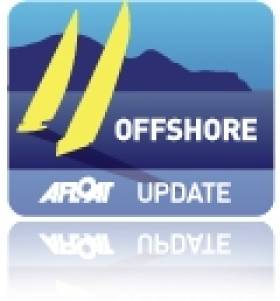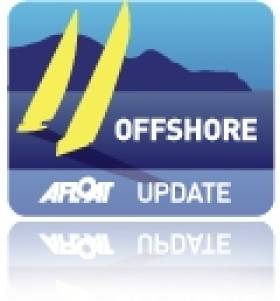Displaying items by tag: Transat Jacques Vabre
British Class 40 Concise 8 Abandons Transat Jacques Vabre
#jacquesvabre – British co-skippers Ned Collier Wakefield and Sam Goodchild are safely in Muros, NW Spain with their Class 40, Concise 8 this morning, having confirmed their abandonment from the 2013 Transat Jacques Vabre double-handed race from Le Havre to Itajaí, Brazil. Their boat suffered damage to the blade of its port rudder last night and was followed by damage to other essential fittings.
The incident happened yesterday evening at between 2100hrs and 2200hrs UTC while racing in 25-26kts of NE'ly winds and rough seas when they were approximately 45 miles NW of Cape Finisterre.
Further information will be distributed in the early afternoon.
Solidaires en Peloton the French Class 40 co-skippered by Victorien Erussard and Thibaut Vauchel-Camus will make a technical stop, expected to be in Cascais.
Update on Arkema-Region Aquitaine after capsize Sunday evening:
A tug has left Lisbon last night at 2200hrs UTC and will arrive on zone tomorrow morning.
See latest postions for the fleets:
http://www.transat-jacques-vabre.com/fr/classement
Damian Foxall Set for 2013 Transat Jacques Vabre on Oman Sail
#TJV – Ahead of the Transat Jacques Vabre (TJV) in November, Oman Air-Musandam skippers Sidney Gavignet (FRA) and Damian Foxall (IRL) are leaving no stone unturned in their preparations to become the first MOD70 champions of the event.
Throughout the month of September, having qualified for the TJV by competing in the Rolex Fastnet Race in August, they have been putting their skills and temperaments to the test with a series of weather workshops, offshore challenges against MOD70 rivals and some heavy-duty training camps at the offshore training centre at Port La Foret in France.
They have been observed for compatible strengths and weaknesses and as a result, decided on a three-hour on three-hour off watch system that they believe will work well for them as they find a balance between pushing the boat hard and safe sailing.
"The most important thing about competing in a one-design boat is not only boat speed but avoiding mistakes in terms of breaking things or making bad manoeuvres and working out the best way to go," said Gavignet, who estimates the 5,450nms course from Le Havre to Itajaii in Brazil will take around 14 days.
"It is important that we understand the key moments of the race and when to push and when to ease up. We also need to understand energy management because bad decisions are mainly caused by fatigue so we have always to be aware of that.
"We have done a weather course with Jean-Yves Bernot – we did the same course before the Route des Princes which was very useful and makes us aware of the different scenarios so that we are prepared for them."
This is not the first time Gavignet and Foxall have competed together in a two handed transatlantic race (in 2008, they raced the Transat AG2R together, finishing in fifth place), but during the 2013 Route des Princes campaign in the summer and in subsequent training, they have identified a shared characteristic that they realise will require conscious moderating.
"In terms of skills, we have similar profiles but we both push the boat hard so we have to take it easy, keep a clear mind and slow down. Think more and act less. It is both a strength and a weakness," Gavignet said.
For Foxall, Ireland's most successful offshore sailor with two Volvo Ocean Race wins under his belt as well as his Barcelona World Race victory in 2007-08, the TJV is unfinished business after he was airlifted off Orma 60 trimaran Foncia when he and co-skipper Armel Le Cleach capsized.
That was eight years ago and although he is confident he and Gavignet can fend off challenges from the other two MOD70s Virbac-Paprec 70 and Edmond de Rothschild, he is under no illusion how difficult it will be.
"Of all the sailing I have done, this is without doubt the most demanding," he said.
"If you have too much sail area up on a multihull, it can be terminal and there are only two people to deal with it. Having said that, the boats require to be pushed and you push it much closer to 100% than you would if you were single-handed.
"It is very important at all times to be in control and always have one, if not two ways of depowering the boat.
"We'll push the boat hard but stay within the limits. Having too much sail area is not necessarily the fastest way to go forward."
Between now and the start of the TJV on Sunday 3 November, Gavignet and Foxall will continue their training sessions at Port la Foret with more test sailing before leaving for Le Havre around the 22 October.
Campaigning Oman Air-Musandam in the 2013 Route des Princes, Gavignet and Foxall were lucky to be part of a crew of six including Omani sailors Fahad Al Hasni and Ahmed Al Hasni but for the Transat Jacques Vabre, while Fahad will be supporting the crew with preparations and training sessions and observing to further his ability, he won't be racing this time.
"While I have learnt a lot already and am training as much as possible, it will take a few more years of experience for me to be ready for a two-handed race like this," said Fahad who will be on site in Le Havre for the start to support Sidney and Damian. "The MOD70 is a challenging boat and while I have learnt a huge amount sailing it crewed, and one day hope to race this event, for now I am supporting my team mates with their preparations."
The TJV starts from Le Havre on 3 November but to ensure all classes arrive in Brazil at around the same time, the MOD70s will start with the rest of the fleet but race just 40 miles in a prologue to decide the starting sequence when they start again on 8 November.
Coming up:
Training session in Port la Foret 23-26 September

























































